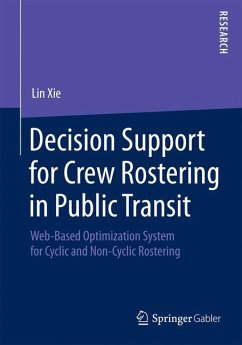
Team-oriented Airline Crew Scheduling and Rostering
Problem Description, Solution Approaches, and Decision Support
Versandkostenfrei!
Versandfertig in 6-10 Tagen
45,99 €
inkl. MwSt.

PAYBACK Punkte
23 °P sammeln!
In this work Markus P. Thiel introduces the Team-oriented Scheduling Problem (ToSP). ToSP shows that, independent from the assignment approach chosen (bidline systems, personalized rostering or preferential bidding systems) all serve to minimize cost, but none of these systems accounts for frequently changing team compositions throughout the day or from day-to-day. This results in crew members rarely getting a chance to know the strengths and weaknesses of their team-mates even though this may present critical safety issues such as cockpit emergencies. The author s emphasis is on the personali...
In this work Markus P. Thiel introduces the Team-
oriented Scheduling Problem (ToSP). ToSP shows that,
independent from the assignment approach chosen
(bidline systems, personalized rostering or
preferential bidding systems) all serve to minimize
cost, but none of these systems accounts for
frequently changing team compositions throughout the
day or from day-to-day. This results in crew members
rarely getting a chance to know the strengths and
weaknesses of their team-mates even though this may
present critical safety issues such as cockpit
emergencies. The author s emphasis is on the
personalized rostering in the Team-oriented
Rostering Problem (ToRP). Tailored to cockpit crew
requirements several optimization models are
examined. Based on a case study a set of solution
approaches is presented. The implied trade-off
between additional operational cost and the selected
evaluation criteria for team orientation is
assessed, along with further computational results
embedded into a decision support system. This work
greatly enhances existing concepts and solutions
approaches for researchers and practitioners in the
area of team scheduling.
oriented Scheduling Problem (ToSP). ToSP shows that,
independent from the assignment approach chosen
(bidline systems, personalized rostering or
preferential bidding systems) all serve to minimize
cost, but none of these systems accounts for
frequently changing team compositions throughout the
day or from day-to-day. This results in crew members
rarely getting a chance to know the strengths and
weaknesses of their team-mates even though this may
present critical safety issues such as cockpit
emergencies. The author s emphasis is on the
personalized rostering in the Team-oriented
Rostering Problem (ToRP). Tailored to cockpit crew
requirements several optimization models are
examined. Based on a case study a set of solution
approaches is presented. The implied trade-off
between additional operational cost and the selected
evaluation criteria for team orientation is
assessed, along with further computational results
embedded into a decision support system. This work
greatly enhances existing concepts and solutions
approaches for researchers and practitioners in the
area of team scheduling.












